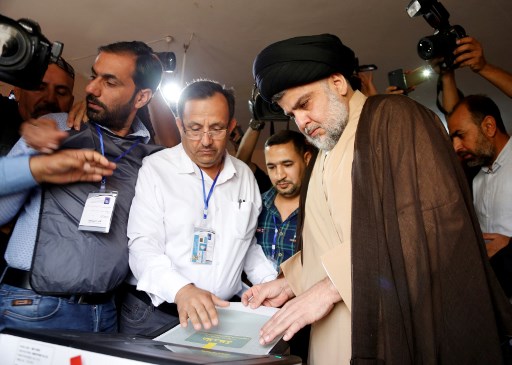
Polling stations opened at 7:00 am for the roughly 24.5 million registered voters to cast their ballots across the conflict-scarred nation. / AFP PHOTO
by Sarah Benhaida
Agence France Presse
BAGHDAD, Iraq (AFP) — An alliance spearheaded by nationalist cleric Moqtada Sadr looked on the course Monday for a surprise triumph at Iraq’s first nationwide election since the defeat of the Islamic State group.
In a further political upset, the rival Conquest Alliance of pro-Iranian former fighters appeared to be coming in second, squeezing internationally favored prime minister Haider al-Abadi into third.
The outcome throws open the race to become the next premier, following a parliamentary vote on Saturday hit by record abstentions and widespread disillusionment.
Shiite preacher Sadr — who did not stand as a candidate and therefore cannot head the government — appears set to play kingmaker after years on the sidelines.
In a tweet, he appeared to point towards a broad technocrat coalition with leading blocs, including Abadi’s, but left main challenger the Conquest Alliance off the list.
Sadr has reinvented himself as an anti-graft crusader after rising to prominence as a powerful militia chief whose group waged a bloody insurgency against US forces after the 2003 invasion.
While long railing against the US, the populist firebrand has also distanced himself from its key rival Iran, drawing closer to regional Sunni powerhouse Saudi Arabia.
With 16 of 18 provinces counted, Sadr’s Marching Towards Reform alliance, which includes Iraq’ communists, was ahead in six and second in four regions.
Next, in the running was the Conquest Alliance, made up of ex-fighters from mainly Iran-backed paramilitary units that battled IS, with results putting them ahead in four provinces and second in eight others.
The head of the list is Hadi al-Ameri, a long-time ally of Tehran, whose forces ended up battling alongside the US to oust the jihadists.
Both Sadr and Ameri are political veterans well-known to Iraqis, but they pitched themselves as outsiders seeking to sweep clean the country’s reviled elite.
The complex electoral arithmetic of the Iraqi system, however, means that the final makeup of 329-seat parliament is still far from decided.
In a televised address Monday afternoon, Abadi hailed the “winning lists” and called on all sides to “respect the results”, after calls for a recount in the multi-ethnic province of Kirkuk.
Election officials said that full final results could be announced in the next 24 hours.
Whatever the outcome, there looks set to be lengthy horse-trading between the main political forces before any new premier and a coalition government can be installed.
Among the traditional powerbrokers looking set to lose big at the election was divisive former premier Nuri al-Maliki, who remains widely reviled for the loss of territory to IS.
‘Done with corruption’
The electoral surprise comes with tensions surging between the US and Iran after Washington’s withdrawal from the 2015 nuclear deal, sparking fears of a destabilising power struggle over Iraq.
Abadi — who came to power as IS swept across Iraq in 2014 — has been a consensus figure who balanced off the US and Iran.
An official at the US State Department remained coy ahead of the definitive tally, telling AFP “we are awaiting the announcement of the official results and look forward to the formation of the new government”.
The ballot saw a record low turnout, as only 44.5 percent of eligible voters headed to the polls in the lowest participation rate since the 2003 US-led ouster of Saddam Hussein.
After the announcement that the Marching Towards Reform was ahead in Baghdad, supporters took to the streets in the capital to celebrate early Monday.
Crowds of mainly young people waved flags and pictures of the populist nationalist cleric Sadr while fireworks fired off into the night sky.
Zeid al-Zamili, 33, described the vote as a “new chapter for the Iraqi people”.
“We’re done with corruption and the corrupt, we’ve suffered for years, now everything will change,” added another supporter in a black t-shirt.
In the cleric’s impoverished Sadr City neighborhood in Baghdad residents said they were hoping for improvements after the elections.
“Today we finally have hope,” said local Ghassan Matar.
Whoever emerges as premier will face the mammoth task of rebuilding a country left shattered by the battle against IS — with donors already pledging $30 billion (25 billion euros).
More than two million people remain internally displaced across the country and IS — while weakened — still has the capability to launch deadly attacks.
© Agence France-Presse







